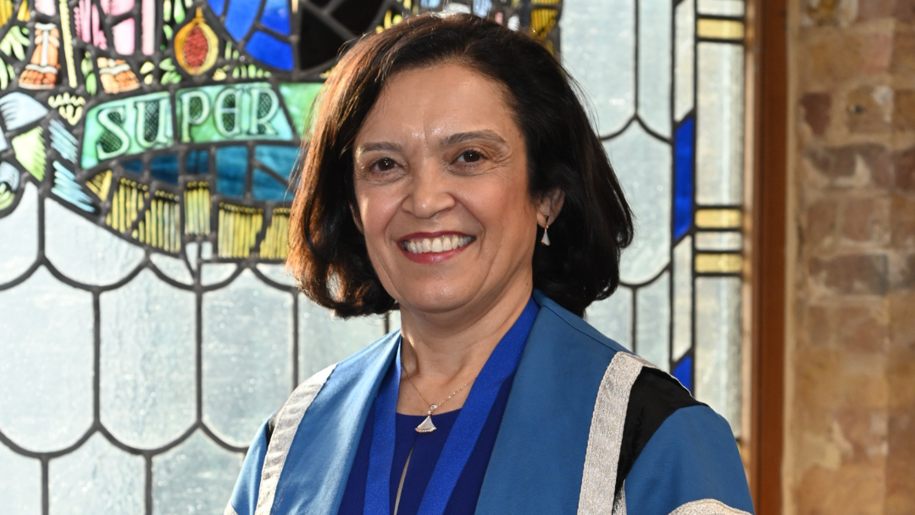Supporting our membership to respond to the climate crisis and advocating for a healthier future for women and girls
“A key priority for my term of office as president will be to work with the membership to bring about meaningful change in response to the climate crisis. The College has made great strides in recent years to make its operations more sustainable. I wish to build on this work to date and support meaningful changes in the way we practice to ensure we become increasingly more sustainable in the way we all deliver care.” – RCOG President Dr Ranee Thakar

Introduction
The climate and ecological crisis affects women's sexual and reproductive health and rights, from the streets of the UK, where air pollution limits lives and affects pregnancy outcomes, to the severe disruption to health care experienced by women and girls living in areas most vulnerable to the effects of increasingly extreme weather.
In March 2023, the United Nations body for assessing the science related to climate change (the IPPC) set out evidence of the rapidly closing window of opportunity to secure a liveable and sustainable future.[1] A strong RCOG response has never been more urgent.
Becoming a sustainable College
We are currently developing a comprehensive programme of work to support our membership to provide more sustainable care, to advocate for change at a national level, and to limit the College’s own contributions to the climate and ecological crisis. One of our first priorities is a project working with maternity professionals and women to develop resources which support the delivery of more sustainable maternity care. We are currently recruiting a Clinical Fellow to lead and deliver this important programme. Applications are now closed.
The RCOG is an active member of the UK Health Alliance on Climate Change (UKHACC), which brings together health professionals to advocate for just responses to the climate and ecological crisis, promote the health benefits that flow from those responses, and empower members and health professionals to respond to the crisis in their professional and personal lives. Dr Ranee Thakar has been elected as a Trustee for the UKHACC, further deepening the RCOG’s involvement with the organisation (see here for more information)
We were proud to sign up to UKHACC’s member commitments in 2023 and are shaping our future work around these principles. Work is also being developed in accordance with the annual Climate and Health Scorecard for UK professional and regulatory health organisations, which we participate in. We look forward to the 2022 results, which will reflect the acceleration of our work in this area. We were also delighted to have recently been shortlisted for the 2023 Memcom Sustainability Award reflecting progress towards sustainability across College activities.
It is also important that this links with our focus on racial equity in the specialty, another Presidential priority, recognising the clear links between inequalities in women’s health and the climate and ecological crisis, which itself is tightly wound with inequality, oppression and health inequities.
This ambition sits alongside, and is supported by, our work to become a diverse and inclusive employer.
Our progress
Launch of the Green Maternity Challenge to reduce carbon and inequity in maternity Care
In 2024, the College was awarded funding from the Small Business Research Initiative (SBRI) Healthcare Programme competition to deliver a project to identify carbon and inequity hotspots in the maternity care pathway with a view to supporting the NHS to implement lower carbon care models. This programme is a collaboration between the Royal College of Midwives (RCM), Centre for Sustainable Healthcare (RCM) and the Sustainable Healthcare Coalition. A Clinical Fellow has been recruited to lead this activity and it is supported by an advisory group of experts representing the voices of our members.
At the heart of this work is a diverse group of 10 members of the public with lived experience of using maternity services. The group ensures that the needs of women and people accessing maternity care are central to this project and that any proposed solutions to tackling carbon and health inequity hotspots support choice, informed consent and personalised care whilst not exacerbating health inequalities or contributing to experiences of poor care.
The project began by mapping the maternity care pathway to understand the key carbon and inequity hotspots, and a literature search has been completed to understand the existing published materials on successful initiatives to address carbon emissions in the maternity care pathway.
The next phase of this work was the Green Maternity Challenge. This has seen multi-professional teams across the UK developing and implementing sustainable quality improvement (SusQI) projects, addressing identified target areas of environmental harm and inequity in maternity care. These teams have received expert mentoring and support from the Centre for Sustainable Healthcare (CSH) to ensure these projects can be as impactful, practical and implementable in practice around the country as possible.
The Green Maternity Conference
The Green Maternity Conference took place in March 2025, bringing together healthcare professionals, policymakers and researchers to explore collective action for more sustainable, equitable maternity care.
Multidisciplinary teams from the Green Maternity Challenge shared their experiences of designing and delivering sustainable quality improvement (SusQI) projects, highlighting opportunities to reduce carbon and tackle inequity in maternity pathways.
We’ll be sharing outcomes and next steps from the conference soon. In the meantime, you can access the Green Maternity reading list, developed by the RCOG and RCM Library teams, which brings together key resources on sustainability in maternity care.
Strategic goals for sustainability and carbon reduction
Ensuring our environmental sustainability and significantly reducing our carbon footprint are College strategic goals for 2020-2025.
We have committed to reducing our carbon emissions by 50% by 2030 from a 2019 baseline, with several initiatives already showing results, including improvements to building operations, reducing waste and switching electricity provision entirely to 100% renewable energy. We have replaced single-use plastic in our catering with reusable, plant-based or easily recycled materials. We are even growing wild flowers at our home in London and have our own colony of bees – See our beehives at 10 Union St streaming live.
As a global College, we have employed digital technology to transform our operations. Our education initiatives and events have been brought online where appropriate and our prestigious exams have been digitised and made available online in test centres around the world, closer to the geographic locations of the candidates. We have also recently changed our travel and investment strategies to put increased emphasis on environmental sustainability.
Supporting our membership
As part of our membership package, we released a three part course on climate and health. The course explores the impact of climate change on health, the contribution of healthcare to environmental damage, the concept of carbon hotspots and carbon footprinting, The principles of sustainable clinical practice and other ways health workers are influencing environmental policy and action. It is free to access via RCOG Learning.
College representatives have also been involved in the development of the upcoming Green Surgery Report, a national initiative funded by the Health Foundation which provides an evidence-based guide and recommendations on how to mitigate the carbon footprint associated with surgical practice.
For more information please see Dr James Phillips blog.
Spotlighting key issues at our annual World Congress has been a priority in recent years, with sessions on women’s health and climate change, sustainability and health from Greener NHS lead, and air pollution in pregnancy available to attendees.
Advocating for cleaner air and climate action which responds to women’s health needs
We recognise the opportunity we have as obstetricians and gynaecologists to advocate for climate mitigation and adaptation strategies that respond to the varied impacts on the health of women and girls, supporting policymakers to make decisions about the environment which positively impact our health.[2]
In the last two years we have focused on the impact of air pollution, which can damage health across our lifetime and has particular risks for pregnant women and during fetal development. We have published a position statement setting out evidence and recommendations, which was updated in our submission to the UK Government’s 2022 consultation on environmental targets.
We have also brought these concerns to Parliament, including working with the Royal College of Paediatrics and Child Health to host a roundtable where parliamentarians and civil servants heard from clinicians and those with lived experience about the health impacts of air pollution during pregnancy and childhood.
We regularly contribute to the development of UKHACC’s advocacy work and calls for action on clean air, fossil fuel transition, sustainable diets and climate justice. We also worked with UKHACC and the RCPCH on the 2021 UK policy briefing for the Lancet Countdown: Tracking Progress on Health and Climate Change, highlighting the need for action on air quality, heatwave preparation and a transition towards renewable energy.
Get involved
Learn
RCOG Modules on Climate and Health:
- Module 1: The Impact of Climate Change on Health
- Module 2: The Contribution of the Healthcare Sector to the Climate and Ecological Emergency
- Module 3: How Health Professionals Can Engage in Climate Mitigation and Improve Their Services
For further sustainability training, the 'Building a Net Zero NHS' training module is an introductory session available freely to all NHS staff. The accessible 30-minute session has already gained significant traction, with over 50,000 launches in its first two years. It can be accessed here.
The ‘Carbon Literacy for Healthcare eLearning Pathway’ is a great follow up to the ‘Building a Net Zero NHS’ training to expand your knowledge and involvement in climate sustainability; accessed here.
BMJ series Sustainable practice: what can I do?
A new BMJ series offers tangible actions clinicians can take to reduce the carbon footprint of healthcare. Use this tool to find ideas for making your practice more environmentally friendly, from articles published in The BMJ, or submit your own article ideas.
Join
The Centre for Sustainable Healthcare Women's Health Sustainability Network:
An online community of healthcare professionals committed to tackling the environmental impact of women's health. The Network aims to foster collaboration between obstetricians, gynaecologists, midwives, sexual health practitioners, nurses, researchers, educators, and students to improve the sustainability of our specialty by sharing knowledge, ideas and examples of good practice.
Read
- Giudice C L et al, Climate change, women’s health, and the role of obstetricians and gynecologists in leadership (2021)
- A special article in the International Journal of Gynecology & Obstetrics (IJGO) looking at the processes by which increasing levels of greenhouse gasses are impacting sexual and reproductive health and rights and maternal, newborn and child health. See also the IJGO special issue on the impact of global warming on women’s health.
- UK Health Alliance on Climate Change calls for action
Read the health community’s recommendations for cleaner air for all, a transition away from fossil fuels, sustainable diets
[1] IPCC, Urgent climate action can secure a liveable future for all (2023)
[2] Giudice C L et al, Climate change, women’s health, and the role of obstetricians and gynecologists in leadership (2021)

Watch presentations and read a summary of discussions from Dr Ranee Thakar’s member workshop on her ambition for sustainability and climate change
